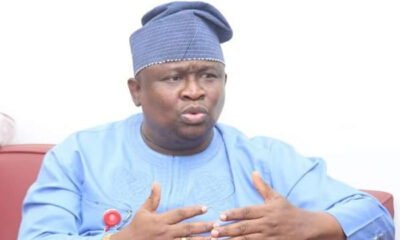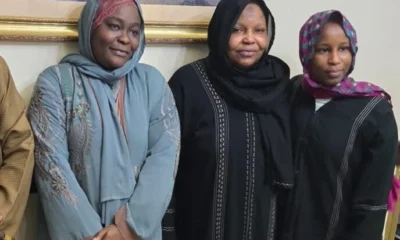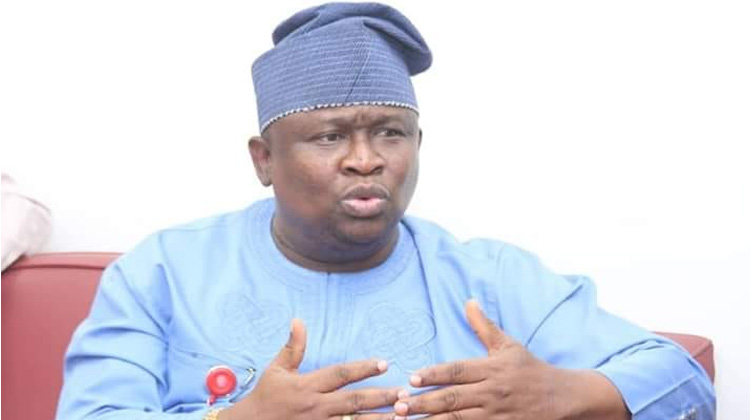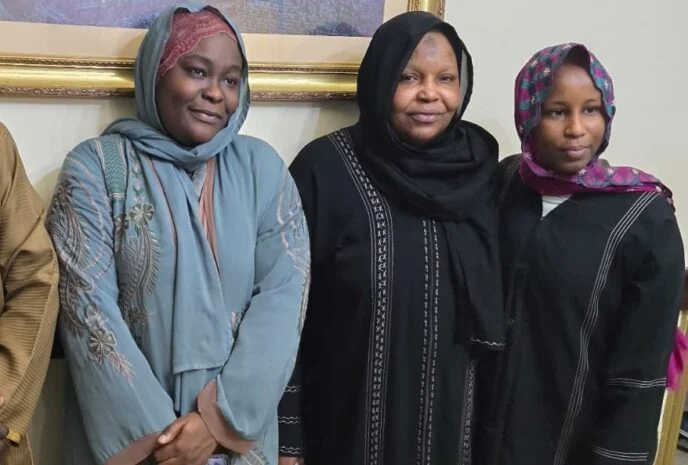The Central Bank of Nigeria (CBN), on Monday, took its fight to boost foreign exchange liquidity in the economy a step higher with a new circular mandating Deposit Money Banks to stop the use of foreign currencies as collateral for naira loans within 90 days.
This occurred on Monday when the naira strengthened against the US dollar on the official and black markets.
By taking a number of steps to strengthen the naira versus the US dollar, the CBN has intensified its fight to remove dollar liquidity that has built up in the financial sector.
On Monday, the Olayemi Cardoso-led CBN issued a new circular, expressing concerns over the use of foreign currencies as collateral for naira loans.
The circular made available on its website and titled “The use of foreign-currency-denominated collaterals for naira loans”, was referenced BSD/DIR/PUB/LAB/017/004.
Although this is not the first time the bank has prohibited the use of FCY, it said it had observed the use of foreign currency by bank customers as collateral for naira loans. Hence, the decision to prohibit its use.
In 2023, in a confidential letter to commercial lenders, the apex bank issued a stern directive against naira overdrafts backed by foreign currency deposits.
In the leaked letter dated August 17, 2023, and signed by the Director of Banking Supervision, Mr. Haruna B. Mustafa, the CBN said the development followed its findings from a recent supervisory review.
It was uncovered that the banks had been offering naira overdraft facilities secured with foreign currency deposits.
Despite this warning, the new directive indicates that banks have continued to engage in such practices.
In the latest circular signed by the acting Director, Banking Supervision Department, Adetona Adedeji, the apex bank said it observed the use of foreign currency by bank customers as collateral for naira loans.
As such, the regulator directed banks to trim all existing loans with foreign currency collaterals to 90 days or attract a 150 per cent capital adequacy ratio computation as part of the bank’s risk.
The new directive means a borrower may no longer use dollar deposits in their domiciliary bank accounts as collateral to obtain naira loans.
According to stakeholders, the practice is partly due to the need to hedge against foreign currency spikes which can be costlier than interest rates.
“The Central Bank of Nigeria has observed the prevailing situation where bank customers use foreign currency as collaterals for Naira loans.
“Consequently, the current practice of using foreign currency-denominated collaterals for Naira loans is hereby prohibited except where the foreign currency collateral is Eurobonds issued by the Federal Government of Nigeria or guarantees of foreign banks, including standby letters of credit.
“In this regard, all loans currently secured with dollar-denominated collaterals other than as mentioned above should be wound down within 90 days, failing which such exposures shall be risk-weighted 150% for Capital Adequacy Ratio computation, in addition to other regulatory sanctions,” the circular read.
The CBN’s stance against such practices arises from concerns of currency mismatch, which could introduce substantial financial risks for banks.
Rather than convert their dollars to naira, some borrowers will rather borrow in naira as the cost of buying the dollars back might be higher than the interest rate they pay for borrowing in naira.
However, this can have a ripple effect on the exchange rate due to its speculative tendencies.
The CBN maintained that it was on a mission to ensure adequate foreign exchange in the market even as the naira gains strength.
Eurobonds, according to the Hong Kong and Shanghai Banking Corporation, are bonds issued offshore by governments or corporations denominated in a currency other than that of the issuer’s country.
Eurobonds are usually long-term debt instruments and are typically denominated in US dollars.
Letters of Credit, according to the International Trade Administration, are contractual commitments by the foreign buyer’s bank to pay once the exporter ships the goods and presents the required documentation to the exporter’s bank as proof.
As a trade finance tool, Letters of Credit are designed to protect both exporters and importers.
In the apex bank’s previous circular to all the banks signed by its former Director, Corporate Communications Department, Ibrahim Mu’azu, the bank said its attention was drawn to the increasing use of foreign currencies in the domestic economy as a medium of payment for goods and services by individuals and corporates.
It also observed that some institutions price their goods and services in foreign currencies and demand payments in foreign currencies rather than the domestic currency (the Naira), which is the legal tender in Nigeria.
The CBN stated, “For the avoidance of doubt, the attention of the general public is hereby drawn to the provisions of the CBN Act of 2007, which states inter-alia that “the currency notes issued by the Bank shall be legal tender in Nigeria…for the payment of any amount.”
Furthermore, the Act stipulates that any person who contravenes this provision is guilty of an offence and shall be liable on conviction to a prescribed fine or six months imprisonment.
Meanwhile, the naira has maintained its appreciation on the official and parallel markets against the United States dollar, strengthening to N1,230/$ at the official market and N1,220/$ on the black market at the close of trading activities on Monday.
This new rate which follows the decision by the CBN to adjust downward, the rate it sells to the Bureau Change Operator, showed a 3.33 per cent appreciation over the N1,240/ dollar it exchanged on Friday at the parallel market.
The CBN on Monday reviewed the exchange rate for the Bureau De Charge Operators to N1,101 per dollar from N1,251/$1 as it plans to sell $15.88 million to 1,588 eligible BDCs.
In a letter addressed to the president of the Association of Bureau De Change Operators of Nigeria, the CBN announced the sale of $10,000 to the BDC operators at an exchange rate of N1,101 per US dollar.
This measure is intended to facilitate access to foreign exchange for legitimate transactions within the retail market.
The letter, signed by W.J. KANYA on behalf of the director of the trade and exchange department, outlines the directive for BDCs to sell the acquired forex to eligible end-users at a spread not exceeding 1.5 percent above the purchase price.
Reacting to its effect on trade, a Bureau De Change operator selling at the popular Wuse Zone 4 market, Ibrahim Suleiman, said the new policy was causing heavy losses to traders, adding that the dollar would keep depreciating.
An affected trader, Malam Yahu Ibrahim, said the dollar was bought between N1,150 and N1,170 and sold at N1,220, leaving a profit margin of N50.
He said, “We are facing serious problem right now due to the way the dollar is crashing, the new rate by the CBN has disrupted a whole lot in the system. We are buying between range of N1,150 and N1,170 and selling at N1,220. And we still expect that the dollar will continue to crash. the things is just coming down anyhow. If I tell how much people are losing every day, you won’t believe it. It is just sad but it’s meant to make our economy better.
At the official market, the naira closed at N1,230/$ against the greenback from the N1,251.05/$ recorded on Friday, indicating a marginal appreciation of N21 or 1.67 percent against the dollar.
This was supported by improved dollar supply at the Nigerian Autonomous Foreign Exchange Market.
The dollar supply on Monday however decreased by 49 per cent to $125.55 from $248.27m recorded on Friday.
The summary of the FX auction showed that the intraday high strengthened to N1, 261 stronger than N1,281 per dollar quoted on Friday. The intraday low increased to N1, 200 per dollar from N1,220 per dollar recorded last week.
With the new rate, the black market is currently selling higher than the official market.
The CBN decision to review the BDC rate followed an appeal by the Association of Bureau De Change Operators of Nigeria, the umbrella body for BDC operators. ABCON National President, Aminu Gwadabe, had written a letter to the CBN.
Meanwhile, experts have commended the CBN for the latest move, saying it would help shore the dollar value.
Analysing the action of the apex bank, the Director of Research and Strategy, Chapel Hill Denham, Tajudeen Ibrahim, said that the move was a step in the right direction, which would boost dollar supply in the currency market and strengthen the naira.
He said, “The CBN is tackling the foreign currency challenge in a tactical manner and this is one of such ways through which they are making efforts to solve the problem. What this implies is that for you to have dollar collateral for a naira denominated loans, it is a mismatch in the first instance. A customer has gone to the bank to borrow N5bn and then if a bank should take an asset that is valued in dollars, maybe currency in its domicilary banks account or any asset that is sold would be sold in dollars, the bank now holds those assets as collateral. Over the years, if naira weakens, the value of those assets would be appreciating and that is one thing that can embolden the banks to want to speculate on the currency.”
Ibrahim maintained that given that the CBN had restricted the net open position of banks on foreign currency assets and liabilities, it is right to scrap the practice of banks holding foreign currency as collateral for naira loans.
“Since the CBN scrap the NOP on the banks, it is also good that they also scrap this one too. If they don’t scrap it, banks would be collecting dollar collateral meanwhile it is naira that they have lent. The point is that when they collect dollar collateral, what it means is that its gives the banks the chance to possibly speculate in the currency market, which is something that the current CBN leadership does not want because speculation distorts the stability of our currency,” he said.
“Secondly, the development will resolve the situation where those holding such dollar assets will have to dispose of them. The banks have to wind down those loans within the next 90 days and if you have to wind them down, it means, the collateral have to go. For the collateral to go, you have to sell them. When you sell them, you are supplying dollars to the market, improving the value of the naira in that regard,” Ibrahim concluded.
Also commenting, an analyst at FSDH Merchant Bank, Ayodele Akinwunmi, said, “In my view the CBN wants banks to encourage clients to deploy the Dollar in their positions instead of keeping the Dollar as collateral and be using Naira. This situation will lead to an increase in the supply of Dollars in the country and lead to Naira appreciation.”
Meanwhile, further findings indicate some banks have started negotiating with their customers with a view to liquidating the loans.
The development, according to bank executives, will lead lenders to unfreeze the FX in the domiciliary of banks.
‘”Banks will discuss with their customers and reach agreements on how to liquidate the naira loans so that the domiciliary accounts funds can be released,” the top executive of a mid-size lender said.
According to top bankers, some customers use their domiciliary account balances and sometimes FX cash as collateral for naira loans.
“There was time when the naira was depreciating very fast; people saved in dollars. They didn’t want to spend it. Some of them then used it as collateral to get naira loans. Now the CBN wants more dollar liquidity in the economy in order to shore up the naira. This is why this directive has come” another top bank executive said under condition of anonymity because he was not authorised to speak on the matter.
Credit: The Punch

 BIG STORY1 day ago
BIG STORY1 day ago
 BIG STORY4 days ago
BIG STORY4 days ago
 BIG STORY4 days ago
BIG STORY4 days ago
 BIG STORY16 hours ago
BIG STORY16 hours ago
 BIG STORY4 days ago
BIG STORY4 days ago
 BIG STORY4 days ago
BIG STORY4 days ago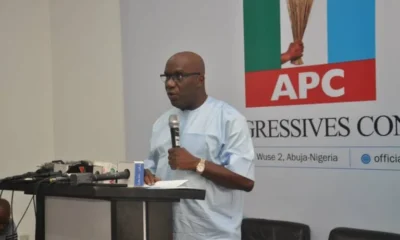
 BIG STORY4 days ago
BIG STORY4 days ago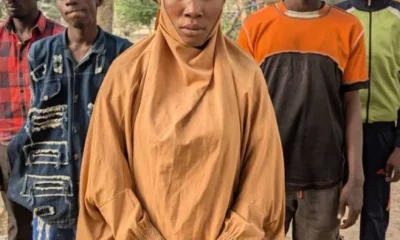
 BIG STORY4 days ago
BIG STORY4 days ago









